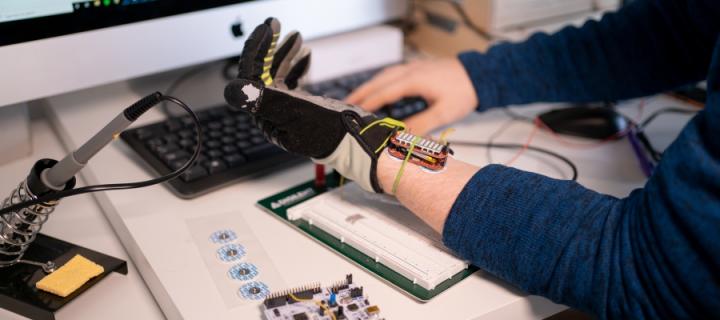Fifteen Pioneering Start-Ups Selected for AI Accelerator
Fifteen start-ups addressing a wide range of pressing global, business and health issues have been selected from applicants across the world to join the Post-Covid AI Accelerator.

Entrepreneurs creating AI-powered robotic gloves, personalised medicine technology and digital tools for the future economy are among groups set to benefit from the post Covid AI Accelerator. The six-month programme aims to help AI start-ups with high growth potential to become world-leading companies, bringing jobs and economic benefits to Edinburgh and the city region.
The accelerator builds on the substantial success of the previous three cohorts, which saw 29 companies raise significant investment and increase their user base. Applicants faced significant competition, with AI start-ups from across the world applying to this prestigious accelerator, with the majority who were successful being established within Scotland.
The AI accelerator is being delivered by the Bayes Centre and Edinburgh Innovations, the University of Edinburgh’s commercialisation service and in partnership with Scale Space.
Global challenges
Each of the groups selected for the programme – which received 86 applications – aims to address a major global challenge, with many focused on urgent health or climate change needs.
Among the successful start-ups are:
- BioLiberty – has designed an AI-powered robotic glove that strengthens the user’s grip. Grip strength declines as we age and BioLiberty’s glove has the potential to restore independence for millions of people in the UK and globally. It is particularly relevant now when people are living longer, are more isolated and can’t easily get support from friends, family and carers.
- Neeuro – provides personalised home-based digital therapeutics programmes utilising Brain-Computer Interface (BCI) technology that incorporates machine learning to help ADHD children improve their attention span. The technology has the potential to be applicable to other brain health conditions.
- Reath – uses data analytics to enable businesses to find safe, compliant and scalable solutions for reusing single use items that have been sent to landfill. Reath’s focus is particularly pertinent given issues around single-use PPE and packaging.
- Data Innovation Al ltd – has created WorkSafeAI that assesses bio-safety risks and optimises mitigations to limit pathogens being transmitted in workplaces, thereby helping to protect the health, performance and productivity of workers.
- Lenz Labs – has developed technology to help trains get better traction on the rails to make perennial issues like ‘leaves on the line’ a fable of the past.
- Net AI – founded by Dr Paul Patras, Associate Professor in the School of Informatics at the University of Edinburgh, is revolutionising cloud-based virtual network management via real time AI analytics. Its cloud-native Microscope solution helps telecom companies reduce costs.
The AI Accelerator Programme will be delivered through Scale Space’s new digital community platform, Scale Space Connect.
A new Entrepreneur in Residence (EIR) has been appointed to support the accelerator activity across the University’s Data Driven Innovation (DDI) Hubs (Usher, EFI, Bayes Centre, the National Robotarium and Easter Bush). Mark Sanders, Executive Chairman, Scale Space will work with the founders to address challenges they encounter in building their businesses, and introducing them to mentors, academics and investors who can help accelerate their companies’ development. His entrepreneurial experience includes leading the fintech company TDX to a £200 million exit to Equifax in 2014.
Tailored Support
Participants will benefit from tailored advice, group working sessions and conferences to help their businesses grow.
Support also includes mentoring on business fundamentals, expert advice from industry leaders, the opportunity to work at Scale Space for the London residential element, Covid rules permitting and access to Scale Space Connect, a digital community that offers business growth services and opportunities to exchange ideas.
Through the Data Driven Innovation (DDI) programme, each of the 15 start-ups will also each receive a £7,500 grant from the Scottish Funding Council.
The Programme will also be supported by NILE. NILE is a multi-talented strategic design team, headquartered in Edinburgh, distributed worldwide. NILE works with multinationals to the start-up next door, to discover, innovate and design better ways to connect with people amidst the complexity of the world today.
In the lead up to COP26, Scotland has the opportunity to take its global focus and demonstrate its leadership in AI, to deliver solutions to climate change, and economic challenges created by the Covid-19 pandemic.
“We are delighted to have received funding from the Scottish funding council through the DDI programme, to enable these dynamic AI companies to grow through participation in the successful Bayes AI accelerator programme. Bayes offers access to world leading academic knowledge, data sets and the UK’s supercomputing facility, together in an environment of investors, entrepreneurs, academics, students and industrial partners.
A key enabler of Scotland’s recovery from COVID-19 is digital and technology, so it’s great to see the University of Edinburgh’s Post-COVID AI Accelerator support companies exploring how AI can be developed and used in many areas, such as health, and helping to tackle the climate emergency.
With Scotland’s AI Strategy due to be launched on 22 March, this is an encouraging demonstration of some of the wealth of AI talent already in Scotland, budding international collaborations, and how AI can be used for good. I look forward to following the progress of the Accelerator going forward.
I’m delighted to see the University of Edinburgh’s Post Covid AI Accelerator bringing together start-ups from such exciting product categories. This is also an excellent opportunity to enrich Scotland’s tech ecosystem with an infusion of international businesses, creating high value jobs in Scotland and addressing some of the social and economic issues arising from Covid-19.
Related links

